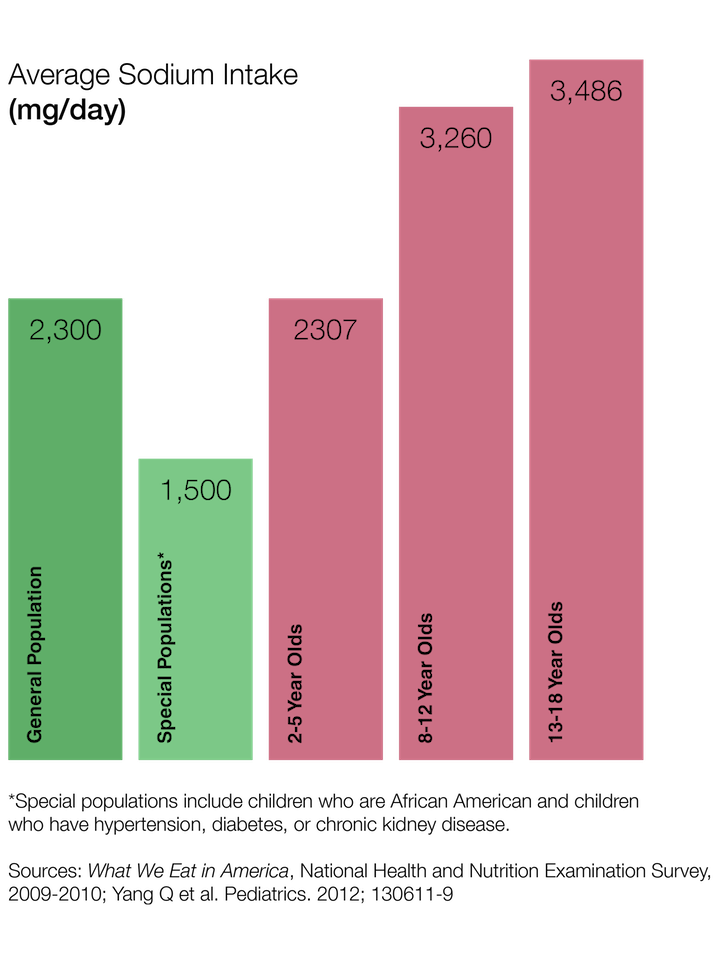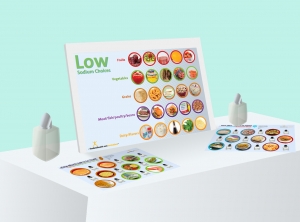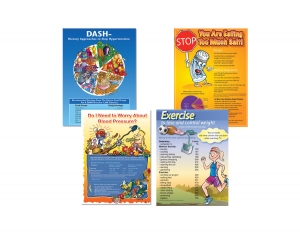News Update: Don't Miss It!
Boy oh boy, do we have news updates for you! The world of nutrition and health research has been on fire lately, so today I'd like to take a few minutes to break down some of the key stories in the media...News Update #1: Sodium Consumption is Getting Further Out of ControlThe U.S. Centers for Disease Control and Prevention (CDC) released a report that revealed that over 90% of all kids* in the U.S. exceed the daily recommend cap on sodium consumption. In other words, 9 out of 10 American children are eating too much salt, every day.Tom Frieden, director of the CDC, released a statement that reads "Most sodium is from processed and restaurant food, not the salt shaker [...] Reducing sodium intake will help our children avoid tragic and expensive health problems."Health problems indeed. According to the Dietary Guidelines for Americans, "On average, the more salt a person eats, the higher his or her blood pressure. Eating less salt is an important way to reduce the risk of high blood pressure, which may in turn reduce the risk of heart disease, stroke, congestive heart failure, and kidney damage. " This issue is often magnified in children who are overweight or obese, and can lead to further heart trouble later in life.Moreover, it turns out that 40% of this excess sodium comes from just 10 common foods. Check out the infographic for a closer look at exactly which foods contribute the most sodium to children's diets. So, what can parents, educators, and health workers do to help control this rampant salt consumption?Well, the CDC asserts, "Studies suggest infants’ and children’s preference for sodium is shaped by dietary exposure, so the less sodium children consume, the less they want." This means that if you cut down on the sodium in the foods that kids eat, they generally won't seek out more sodium later.To accomplish this, help families internalize MyPlate's advice to evaluate the sodium content in a variety of foods and choose the options with the lowest numbers. Following this advice is sometimes easier said than done, but if people make a habit out of it, it will soon become second nature. The CDC advises parents to serve children a variety of snacks based largely on fresh fruits and vegetables. Fruits and vegetables are high in nutrients and low in sodium, after all, and their health benefits are numerous.
So, what can parents, educators, and health workers do to help control this rampant salt consumption?Well, the CDC asserts, "Studies suggest infants’ and children’s preference for sodium is shaped by dietary exposure, so the less sodium children consume, the less they want." This means that if you cut down on the sodium in the foods that kids eat, they generally won't seek out more sodium later.To accomplish this, help families internalize MyPlate's advice to evaluate the sodium content in a variety of foods and choose the options with the lowest numbers. Following this advice is sometimes easier said than done, but if people make a habit out of it, it will soon become second nature. The CDC advises parents to serve children a variety of snacks based largely on fresh fruits and vegetables. Fruits and vegetables are high in nutrients and low in sodium, after all, and their health benefits are numerous. As far as schools are concerned, the CDC recommends, "Schools and school districts can implement food purchasing policies and standards that reduce sodium in foods and put lower-sodium alternatives in vending machines, school stores and cafeterias. They can also strive to meet or exceed the United States Department of Agriculture’s (USDA) Nutrition Standards for foods served during the school day."For more information about this research and its consequences, visit...
As far as schools are concerned, the CDC recommends, "Schools and school districts can implement food purchasing policies and standards that reduce sodium in foods and put lower-sodium alternatives in vending machines, school stores and cafeterias. They can also strive to meet or exceed the United States Department of Agriculture’s (USDA) Nutrition Standards for foods served during the school day."For more information about this research and its consequences, visit...
- CDC: CDC report finds sodium consumption high among U.S. children
- CDC: High Sodium Intake in Children and Adolescents: Cause for Concern
- Reuters: Sodium conundrum: Nine in 10 U.S. children eat too much salt
- Food Safety News: CDC Report Finds High Sodium Consumption Among U.S. Kids
*Between the ages of 6 and 18News Update #2: Many People Who Successfully Maintain Weight Loss Drink Low-Calorie Sweetened BeveragesThe National Weight Control Registry has done it again. This collection of over 10,000 people who have lost a significant amount of weight and kept it off has offered plenty of insight into healthful habits for people who want to successfully control their weight. The research is always moving forward and the latest insight is here:People use low- to no-calorie sweetened beverages to control their calorie intake and successfully manage their weight.A new study from the journal Obesity has revealed that "Drinking low- and no-calorie sweetened beverages, including diet sodas, are common among people who have maintained significant weight loss" (source). Over 400 people who had lost 30 pounds or more and kept it off for at least a year answered a survey about their use of beverages. According to the article, Drinking Low-Calorie Sweetened Beverages Common Among Weight Loss Maintainers, "over 78% of participants who reported weekly consumption of low-calorie sweetened beverages believed that consumption was partially responsible for controlling their calorie intake." The researchers concluded, "Regular consumption of [low/no calorie sweetened beverages] is common in successful weight loss maintainers for various reasons including helping individuals to limit total energy intake. Changing beverage consumption patterns was felt to be very important for weight loss and maintenance by a substantial percentage of successful weight loss maintainers in the [National Weight Control Registry]" (source).That said, water was still #1 among people who had lost weight and kept it off. Staying hydrated and choosing water instead of higher-calorie sweetened drinks is a wise course of action, supported by research in the Dietary Guidelines for Americans and MyPlate.For more information, check out...
The researchers concluded, "Regular consumption of [low/no calorie sweetened beverages] is common in successful weight loss maintainers for various reasons including helping individuals to limit total energy intake. Changing beverage consumption patterns was felt to be very important for weight loss and maintenance by a substantial percentage of successful weight loss maintainers in the [National Weight Control Registry]" (source).That said, water was still #1 among people who had lost weight and kept it off. Staying hydrated and choosing water instead of higher-calorie sweetened drinks is a wise course of action, supported by research in the Dietary Guidelines for Americans and MyPlate.For more information, check out...
- Obesity: Low/No calorie sweetened beverage consumption in the national weight control registry
- CalorieControl.org: Drinking Low-Calorie Sweetened Beverages Common Among Weight Loss Maintainers
- National Weight Control Registry
The fun doesn't stop there! All the infographics and charts featured in this post are available for free. If they could be of any use to you or your clients, download them today!
The Nutrition Education Store is also a fantastic resource, especially when it comes to food and calorie awareness. Check out these great materials...


